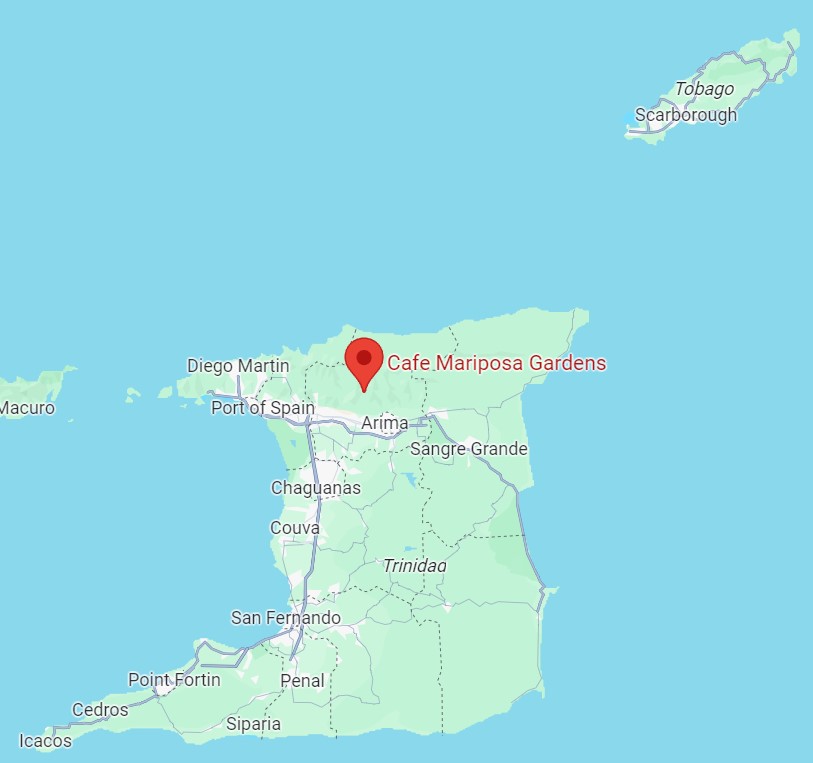Situated in the “Land of the Hummingbirds,” Café Mariposa offers many types of beauty. From homemade meals to tropical scenery to handmade chocolates, the café provides customers with a taste of culture in Trinidad and Tobago. For the past three years, Purdue’s Farmer-to-Farmer (F2F) Trinidad and Tobago program has worked with the café to ensure it can continue providing these experiences to customers.
Café Mariposa has been offering food, tours and overnight accommodations to locals and travelers for over 20 years. The family business was founded in 2001 by brother and sister Arthur and Bianca in Lopinot, Trinidad and Tobago. At its founding, the café only had four tables and a hope that visitors could enjoy “the rhythms of the environment,” according to Marcia Guerrero, Café Mariposa’s general manager.
Now, Café Mariposa employs much of the family and serves people visiting from all over the world. Due to this growth and the stresses of the COVID-19 pandemic, Café Mariposa decided to participate in the F2F Trinidad and Tobago training programs.
Café Mariposa is a member of a group of producers and businesses called the Tri-Valley Cluster. The goal of the Tri-Valley Cluster is to link the three Trinidad valleys of Lopinot, Aripo and Brasso Seco together to support each other and empower group members. Many members of the Tri-Valley Cluster decided to participate in the training to improve the profitability of their businesses.
F2F training is made possible through funding from USAID allocated to the John Ogonowski and Doug Bereuter Farmer-to-Farmer Program. Under Partners of the Americas’ Agriculture Volunteer Opportunity Project (AVOP), Purdue University and the University of West Indies at St. Augustine co-lead an F2F program in Trinidad and Tobago.
Over the past four years, Café Mariposa has received training from 10 F2F U.S. volunteers, some with Purdue connections. One volunteer, Andy Lohof, helped provide financial strategies to the café to make sure everyone got paid. This training has helped Café Mariposa navigate financial decisions, such as whether to invest in air conditioning for an overnight room, whether to pay recurring fees to operate a website and whether to participate in events like restaurant week. Each of these opportunities has allowed Café Mariposa to better serve its customers and grow the business while making sure the business can pay employees.
Another volunteer, Bill Nichols, advised the café on marketing strategies. Some of the strategies included crafting an elevator pitch, cold calling potential partners or suppliers and approaching important business meetings. As a result of the training, Café Mariposa now has a person dedicated to marketing efforts to help the café network with other businesses, draw in new customers and offer experiences to cruise clients.
Hands-on training helped Café Mariposa expand its menu and improve its food production. Volunteers Molly Hoag and Abigail Creigh (who are both a part of Purdue Extension) taught food safety, candying, preserving and the process of making gluten-free flour from roots, like cassava. With this knowledge, Café Mariposa has been able to not only offer special menu options for those on gluten-free diets, but it has also been able to able to provide options for family members following a gluten-free diet. The café has also learned rules like “first in, first out” and how to use different sinks for meats, vegetables and dishes to improve their food safety practices.
Another volunteer, Allison Brown, worked with cluster members to create new recipes using cacao and making other goods. Now, the café has added horchata, protein balls and chocolate bar varieties to its menu, and it produces soap as another product to profit from.
“The training has strengthened my belief in us as a family business,” Guerrero said. “Some days you feel like, ‘What am I doing? Why am I doing this?’ Some days we really have that feeling, but it happens less and less now. COVID-19 did a number on our confidence, but I really feel that we are slowly coming out of that. Hopefully we will be able to move from strength to strength.”
Click HERE for more information about the Purdue-UWI Farmer-to-Farmer project in Trinidad and Tobago.






